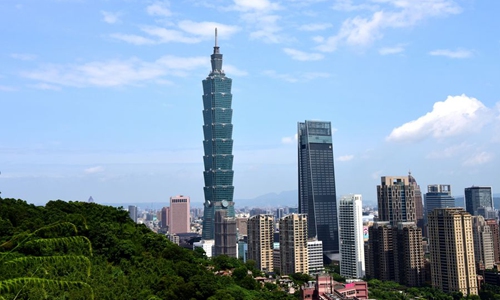HOME >> CHINA
China says relevant US defense act clauses blatantly interfered in its domestic affairs
Source:Xinhua Published: 2019/12/22 9:46:49

Photo taken on July 21, 2019 from Xiangshan Mountain shows the Taipei 101 skyscraper in Taipei, southeast China's Taiwan. (Xinhua/Zhu Xiang)
China on Saturday voiced strong dissatisfaction and resolute opposition to negative clauses on Taiwan, Hong Kong and Xinjiang in the US 2020 National Defense Authorization Act.
You Wenze, spokesperson of the Foreign Affairs Committee of the National People's Congress, said the clauses are unfounded and biased, and have blatantly interfered in China's domestic affairs.
The Taiwan-related content of the act has seriously violated the one-China principle and the three joint communiques between China and the United States, and seriously damaged China-U.S. relations as well as peace and stability across the Taiwan Strait, he said.

Aerial view taken on June 19, 2016 shows the scenery in Hong Kong, south China. (Xinhua/Lui Siu Wai)
Taiwan issue is China's domestic affair that allows no interference, the spokesperson added.
On Hong Kong affairs, the spokesperson stressed that a series of violent crimes in Hong Kong have sabotaged public security and orders, seriously challenged rule of law and the bottom line of the "one country, two systems" principle.
The spokesperson said extreme violent criminal acts cannot be excuses for any aspirations, and the U.S. attempt to interfere in other countries' domestic affairs using the so-call "democracy" and "human rights" will be in vain.

Photo taken on Aug. 20, 2018 shows a view of the Bayan Bulag grassland in northwest China's Xinjiang Uygur Autonomous Region. Located in northwest China, Xinjiang Uygur Autonomous Region boasts three mountains, namely Tianshan, Kunlun and Altay, and two basins, Junggar and Tarim. (Xinhua/Hu Huhu)
On Xinjiang affairs, the spokesperson stressed that Xinjiang-related issues are not about human rights, ethnicity or religion, but about anti-terrorism and de-radicalization. The United States is also a victim of terrorism and should have supported China's anti-terrorism measures, not slander China's efforts in anti-terrorism and de-radicalization.
The spokesperson urges the United States to discard its Cold-War mentality and hegemonic logic, stop interfering in China's domestic affairs and take measures to remove the negative impact produced by this act immediately to maintain China-U.S. relations with concrete actions.
Posted in: DIPLOMACY